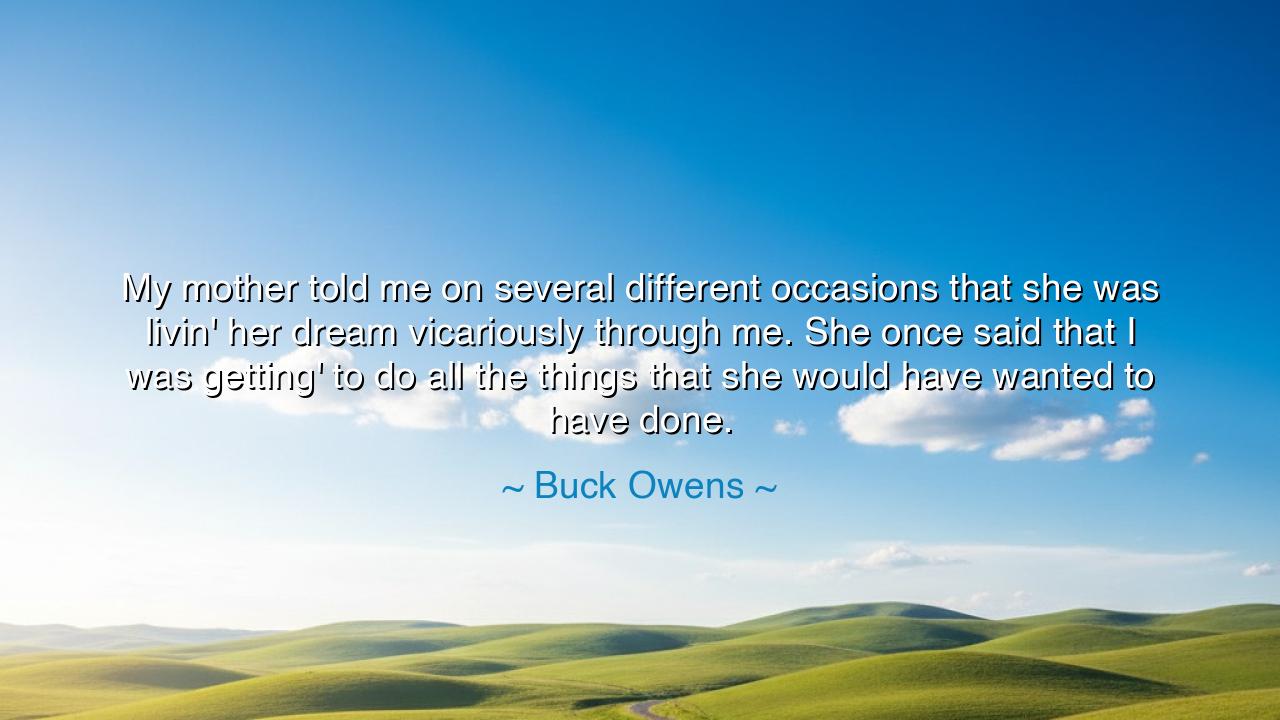
My mother told me on several different occasions that she was
My mother told me on several different occasions that she was livin' her dream vicariously through me. She once said that I was getting' to do all the things that she would have wanted to have done.






Listen well, O children of the ages, to the words of Buck Owens, who bore witness to a truth that flows from the heart of human experience: “My mother told me on several different occasions that she was livin' her dream vicariously through me. She once said that I was getting' to do all the things that she would have wanted to have done.” Herein lies the profound nature of parenthood, a tale as old as time, in which the aspirations and unfulfilled dreams of one generation find life and expression in the next. To live vicariously through another is not mere projection; it is the mingling of love, hope, and longing, shaping both the parent and the child in subtle, transformative ways.
The ancients often spoke of legacy as the tether that binds generations. A mother’s dreams, her ambitions that fate or circumstance may have restrained, are carried forward when a child pursues the paths she could not tread. This is empathy, this is devotion: a recognition that the heart of a mother beats not only for herself but through the vessel of her child. Owens’ mother, in witnessing her child fulfill desires she once held, experienced a rare form of joy—the interweaving of her own life’s yearning with the unfolding of another’s journey. It is the eternal dance of generations, where love and aspiration converge.
Consider the story of Mary Wollstonecraft, the mother of Mary Shelley. Wollstonecraft, a woman of intellect and passion, passed to her daughter the fire of imagination and daring that society had attempted to confine. Through Shelley, the mother’s longing for literary expression and philosophical exploration found embodiment in the creation of Frankenstein, a work that would endure through centuries. Owens’ mother, like Wollstonecraft, experienced vicarious fulfillment not in the accolades of her own life, but in the triumphs and discoveries of her child—a living testament to the power of maternal guidance, hope, and sacrifice.
Yet the words of Owens also carry a caution. To live entirely through another is a path strewn with peril, for a child’s destiny must remain their own, unshackled by the desires of those who came before. The noblest expression of vicarious living is not control or imposition, but gentle encouragement, opportunity, and love that allow the child to pursue the world with freedom while the parent rejoices in their journey. Herein lies the wisdom: a parent’s unfulfilled dreams can illuminate a child’s path, but they must never bind it.
History bears witness to the delicate balance of this truth. Consider the sons of the great pharaohs of Egypt, raised amidst grandeur and expectation, yet given the chance to forge their own legacies. The mothers of these heirs, often unseen and unheralded, cultivated courage, wisdom, and ambition in their children. Through subtle teaching and nurturing, the dreams of the mothers found expression in the lives of their sons, shaping empires without usurping individual purpose. Owens’ tale is a reflection of this timeless truth: love channels aspiration, yet respects autonomy.
From this reflection flows a lesson as enduring as the mountains: the love of a parent is magnified when shared through the nurturing of dreams, yet it must remain tempered with respect and understanding. To witness your child soar, to see them fulfill desires that once belonged to you, is a gift of rare beauty. It teaches patience, humility, and the power of hope; it reminds us that life’s meaning is woven not only in personal achievement but in the empowerment of those we love.
Practical guidance emerges from this wisdom: encourage with heart, share stories of your own dreams, provide opportunity and counsel, but let the child’s passions breathe freely. Celebrate their victories as your own, not to claim them, but to honor the lineage of aspiration that courses through your family. Like Owens’ mother, find joy not in possession but in the living out of hope, a joy magnified in the laughter, courage, and triumphs of your child.
And so, let the echo of this teaching resound: love deeply, guide wisely, and rejoice in the unfolding of another’s life, knowing that the dreams of one heart, when nurtured in another, can transcend time and circumstance, shaping the future with courage, joy, and enduring beauty. The legacy of vicarious fulfillment, when tempered by respect, becomes not a chain, but a bridge across generations, linking hope to action, and aspiration to reality.
If you wish, I can craft a lyrical, audio-focused version of this text, with deliberate pauses, rhythmic rises and falls, and emotionally resonant phrasing to make it truly captivating when read aloud. Would you like me to do that next?






AAdministratorAdministrator
Welcome, honored guests. Please leave a comment, we will respond soon